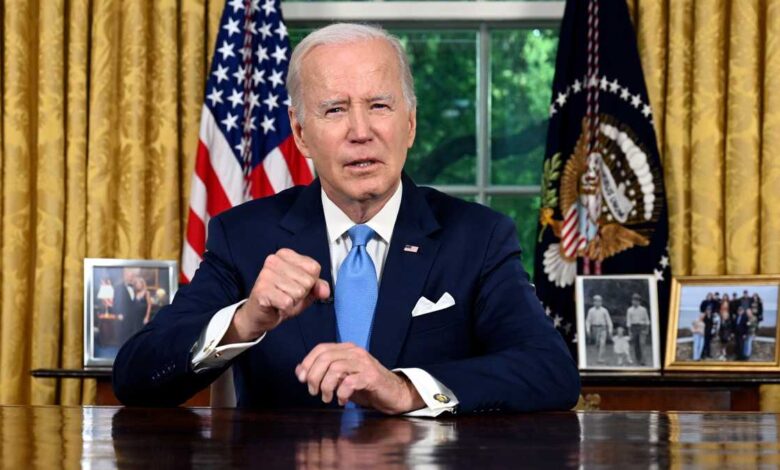
Biden expected to sign budget deal to raise debt ceiling
My fellow Americans when I ran for president, I was told the days of bipartisanship are over and the Democrats and Republicans can no longer work together. But I refuse to believe that because America can never give into that way of thinking. Look, the only way American democracy can function is through compromise and consensus. And that's what I work to do as your president, you know, to forge bipartisan agreement where it's possible and where it's needed. I've signed more than 350 bipartisan laws thus far, almost 2.5 years including the historic law that rebuilding America so that we can rank number one in the world in infrastructure instead of where we're ranked now number 13 in the world, another historic law, rebuilding our manufacturing base. So that will lead the world once again in making semiconductor chips so much more and so so many more and so many more sophisticated ones. And now *** bipartisan budget agreement, this is vital because because it's essential to the progress we made over the last few years is keeping full faith and credit of the United States of America and passing *** budget that continues to grow our economy and reflects our values as *** nation. That's why I'm speaking tonight to report on the crisis of verdict and what we're doing to protect America's future. Passing this budget agreement was critical. The stakes could not have been higher if we had failed to reach an agreement on the budget. There were extreme voices threatening to take America for the first time in our 247 year history and to default on our national debt, nothing, nothing would have been more irresponsible. Nothing would have been more catastrophic. Our economy would have been thrown in *** recession. Retirement accounts from millions of Americans would have been decimated. Eight million Americans would have lost their jobs. Default would have been have have destroyed our nation's credit rating which would have made everything from mortgages to car loans, to funding for the government much more expensive. And it would have taken years to climb out of that hole and America standing as the most trusted, reliable financial partner in the world would have been shattered. So it was critical to reach an agreement and it's very good news for the American people. No one got everything they want but the American people got what they needed. We averted an economic crisis, an economic collapse. We're cutting spending and bringing the deficits down. At the same time, we're protecting important priorities from Social security to Medicare, to Medicaid, to veterans, to our transformational investments in infrastructure and clean energy. I want to commend Senator Speaker mccarthy, you know, uh he and I uh we and our teams, we were able to get along, get things done. We were straightforward with one another, completely honest with one another, respectful with one another. Both sides operated in good faith. Both sides kept their word. And I also want to commend other congressional leaders. House minority leader Jeffries, Senate, majority leader Schumer Senate, minority leader mcconnell, they acted responsibly and put the good of the country ahead of politics. The final vote in both chambers was overwhelming. Far more bipartisan than anyone thought was possible. So I want to thank the members of Congress who voted to pass this agreement, which I'm gonna sign tomorrow and become the law. So here's what the deal does. First, it cuts spending and over the next 10 years, the deficit will be cut by more than $1 trillion and I'll be on top of the record 1.7 trillion $1.7 trillion. I already cut the deficit in my first two years in office and it's clear we're all in *** much more fiscally responsible course than the one I inherited when I took office. Four years ago, when I came to office, the deficit had increased every year, the previous four years and nearly $8 trillion were added to the national debt in the last administration. And now we're turning things around and that's good for America. You know, my dad used to have an expression. He said, Joey, don't tell me what you value, show me your budget. I'll tell you what you value. That's at the heart of this debate. What do we value protecting seniors? You may remember during my State of the Union address, there was, there was *** spirit exchange between me and *** few Republicans spontaneously occurring on the floor of the House of Representatives. I was pointing out that for years, some of them were putting forward proposals to cut Social Security Medicare and some of them that night took exception and they said very loudly that that wasn't true. So I asked them on the floor at that night, I said, ask them *** simple question. Will you agree not to cut social security not to cut Medicare? Would they agree to protect these essential programs? *** lifeline for millions of Americans programs that these Americans have been paying and into every single paycheck they've earned since they started working and it provides so much peace of mind with the bright lights and cameras on those few Republicans who were protesting, they agreed, they said they wouldn't cut it. That's how we protected Social Security Medicare from the beginning and from *** being cut period, health care was another priority for me. *** top priority. I made it clear from the outset, I would not agree to any cuts in Medicaid, another essential lifeline for millions of Americans, including Children in poverty, the elderly, in nursing homes and Americans living with disabilities. The original House Republican proposal would have cut health care for up to 21 million Americans on Medicaid. And I said no, and Medicare is protected and so are millions of people most in need. Look, I've long believed that the only one truly sacred obligation that the government has is to pair those we send into harm's way and care for them and their families when they come home and when they don't come home, that's why my last budget provided va hospitals with additional funding for more doctors, nurses and equipment to accommodate the needs of veterans and more appointments. The House Republican plan would have met 30 fewer million va health care visits for our veterans. We didn't let that happen. In addition, this bill fully funds the bipartisan Pact Act. The most significant law in decades for veterans exposed to toxic burn pits and for their families expands access to those veterans and their families, to health care and to disability benefits. Look, we're investing in America in our people and in our future, we've created over 13 million new jobs. Nearly 800,000 manufacturing jobs. Where is it? Written? And America can't lead the world again. In manufacturing, unemployment is at 3.7% more Americans are working today than ever in the history of this country. And inflation has dropped 10 straight months in *** row. In this debate, I refused to put what was responsible for all this economic progress on the chopping block. This bipartisan agreement protects the law that will help us build the best infrastructure in the world, fully protects the Chips and Science Act, which is gonna bring key parts of our supply chain to America. So we don't have to rely on others like semiconductors, those tiny computer chips smaller than the tip of your finger that affect nearly everything we rely on from cell phones to have building automobiles to the most sophisticated weapon systems. And so much more, we protected another law that I passed and signed last year that finally beat Big Pharma, which I've been trying to do for over 30 years. It finally gives Medicare the power to negotiate lower drug prices just like the VA has been able to do for veterans. This law has already dramatically cut the cost of insulin for seniors from as much as $400 *** month to just $35 *** month for insulin negotiating lower drug prices, not only saves seniors *** lot of money, it saves the country, *** lot of money, 100 and $60 billion. That's not having to be paid out because we're drug prices are more rational. We pay the highest drug prices of any industrial nation in the world. And it's just the beginning, you know, we also protected the most significant breakthrough ever ever in dealing with the existential threat of climate change. Today, new wind and solar power is cheaper than fossil fuel since I've been in office, clean energy and advanced manufacturing have brought in $470 billion in private investment that's going to create thousands of jobs, good paying jobs all across this country and help the environment. At the same time. Remember at the beginning of this debate, some of our Republican colleagues were determined to gut the clean energy investments. I said, no, we kept them all and there's more and there's so much more to do. We're going to do even more to reduce the deficit. We need to control spending if we're going to do that. But we also have to raise revenue and go after tax sheets and make sure everybody is paying their fair share. No one, I promise no one making more, less than $400,000 *** year will pay *** penny more in federal taxes. But like most of you at home, I know the federal tax system isn't fair. That's why I kept my commitment again that no one earning less than $400,000 *** year will pay *** penny more in federal taxes. That's why last year I secured more funding to go more IRS funding to go after wealthy tax cheats the nonpartisan congressional budget office and it is nonpartisan says that this bill will bring in 100 and $50 billion and other outside experts expect that it would save as much as $400 billion because it's forcing people to pay their fair share. Republicans may not like it, but I'm gonna make sure the wealthy pay their fair share. I'm also proposed closing over *** dozen special interest tax loopholes for big oil crypto traders, hedge fund billionaires saving taxpayers billions of dollars. Republi Republicans defended every single one of these special interest loopholes, every single one. But I'm going to be coming back and with your help, I'm gonna win right now. Catch this right now. The average billionaire in America pays just 8% in federal taxes. 8% teachers and firefighters pay more than that. That's why I proposed *** minimum tax for billionaires. Republicans are against it, but I'm gonna keep fighting for it. No billionaire should pay less in federal taxes than the teacher or firefighter. Look, let me close with this. I know bipartisanship is hard and unity is hard, but we can never stop trying because in moments like this one, the ones we just faced where the American economy and the world economy is at risk of collapsing. There's no other way, no matter how tough our politics gets, we need to see each other as not as adversaries, but as fellow Americans treat each other with dignity and respect to join forces as Americans to stop shouting lower the temperature and work together to pursue progress, secure prosperity and keep the promise of America for everybody. As I've said, my inaugural address without unity, there is no peace, only bitterness and, and fury and we can never become that country. I can honestly say, I can honestly say to you tonight that I've never been more optimistic about America's future. We just need to remember who we are. We are the United States of America and there's nothing, nothing we can't do when we do it together. Well, thank you all for listening, taking the time tonight to listen to me. May God bless you all and may God protect our troops. Thank you.
President Joe Biden is expected to sign legislation on Saturday to raise the debt ceiling, just two days before the U.S. Treasury warned that the country would struggle to pay its bills.The bipartisan measure, which was approved this week by the House and Senate, eliminates the potential for an unprecedented government default.“Passing this budget agreement was critical. The stakes could not have been higher," Biden said from the Oval Office on Friday evening. “Nothing would have been more catastrophic,” he said, than defaulting on the country's debt.The agreement was hashed out by Biden and House Speaker Kevin McCarthy, giving Republicans some of their demanded federal spending cuts but holding the line on major Democratic priorities. It raises the debt limit until 2025 — after the 2024 presidential election — and gives legislators budget targets for the next two years in hopes of assuring fiscal stability as the political season heats up.“No one got everything they wanted but the American people got what they needed,” Biden said, highlighting the “compromise and consensus” in the deal. “We averted an economic crisis and an economic collapse.”Video below: A closer look at the debt ceiling billBiden used the opportunity to itemize the achievements of his first term as he runs for reelection, including support for high-tech manufacturing, infrastructure investments and financial incentives for fighting climate change. He also highlighted ways he blunted Republican efforts to roll back his agenda and achieve deeper cuts.“We’re cutting spending and bringing deficits down at the same time,” Biden said. “We're protecting important priorities from Social Security to Medicare to Medicaid to veterans to our transformational investments in infrastructure and clean energy.”Even as he pledged to continue working with Republicans, Biden also drew contrasts with the opposing party, particularly when it comes to raising taxes on the wealthy, something the Democratic president has sought.It’s something he suggested may need to wait until a second term.“I’m going to be coming back,” he said. “With your help, I’m going to win.”Biden's remarks were the most detailed comments from the Democratic president on the compromise he and his staff negotiated. He largely remained quiet publicly during the high-stakes talks, a decision that frustrated some members of his party but was intended to give space for both sides to reach a deal and for lawmakers to vote it to his desk.Biden praised McCarthy and his negotiators for operating in good faith, and all congressional leaders for ensuring swift passage of the legislation. “They acted responsibly, and put the good of the country ahead of politics,” he said.Overall, the 99-page bill restricts spending for the next two years and changes some policies, including imposing new work requirements for older Americans receiving food aid and greenlighting an Appalachian natural gas pipeline that many Democrats oppose. Some environmental rules were modified to help streamline approvals for infrastructure and energy projects — a move long sought by moderates in Congress.The Congressional Budget Office estimates it could actually expand total eligibility for federal food assistance, with the elimination of work requirements for veterans, homeless people and young people leaving foster care.The legislation also bolsters funds for defense and veterans, cuts back some new money for the Internal Revenue Service and rejects Biden’s call to roll back Trump-era tax breaks on corporations and the wealthy to help cover the nation’s deficits. But the White House said the IRS' plans to step up enforcement of tax laws for high-income earners and corporations would continue.The agreement imposes an automatic overall 1% cut to spending programs if Congress fails to approve its annual spending bills — a measure designed to pressure lawmakers of both parties to reach consensus before the end of the fiscal year in September.In both chambers, more Democrats backed the legislation than Republicans, but both parties were critical to its passage. In the Senate the tally was 63-36 including 46 Democrats and independents and 17 Republicans in favor, 31 Republicans along with four Democrats and one independent who caucuses with the Democrats opposed.The vote in the House was 314-117.___AP Congressional Correspondent Lisa Mascaro contributed to this report.
President Joe Biden is expected to sign legislation on Saturday to raise the debt ceiling, just two days before the U.S. Treasury warned that the country would struggle to pay its bills.
The bipartisan measure, which was approved this week by the House and Senate, eliminates the potential for an unprecedented government default.
“Passing this budget agreement was critical. The stakes could not have been higher," Biden said from the Oval Office on Friday evening. “Nothing would have been more catastrophic,” he said, than defaulting on the country's debt.
The agreement was hashed out by Biden and House Speaker Kevin McCarthy, giving Republicans some of their demanded federal spending cuts but holding the line on major Democratic priorities. It raises the debt limit until 2025 — after the 2024 presidential election — and gives legislators budget targets for the next two years in hopes of assuring fiscal stability as the political season heats up.
“No one got everything they wanted but the American people got what they needed,” Biden said, highlighting the “compromise and consensus” in the deal. “We averted an economic crisis and an economic collapse.”
Video below: A closer look at the debt ceiling bill
Biden used the opportunity to itemize the achievements of his first term as he runs for reelection, including support for high-tech manufacturing, infrastructure investments and financial incentives for fighting climate change. He also highlighted ways he blunted Republican efforts to roll back his agenda and achieve deeper cuts.
“We’re cutting spending and bringing deficits down at the same time,” Biden said. “We're protecting important priorities from Social Security to Medicare to Medicaid to veterans to our transformational investments in infrastructure and clean energy.”
Even as he pledged to continue working with Republicans, Biden also drew contrasts with the opposing party, particularly when it comes to raising taxes on the wealthy, something the Democratic president has sought.
It’s something he suggested may need to wait until a second term.
“I’m going to be coming back,” he said. “With your help, I’m going to win.”
Biden's remarks were the most detailed comments from the Democratic president on the compromise he and his staff negotiated. He largely remained quiet publicly during the high-stakes talks, a decision that frustrated some members of his party but was intended to give space for both sides to reach a deal and for lawmakers to vote it to his desk.
Biden praised McCarthy and his negotiators for operating in good faith, and all congressional leaders for ensuring swift passage of the legislation. “They acted responsibly, and put the good of the country ahead of politics,” he said.
Overall, the 99-page bill restricts spending for the next two years and changes some policies, including imposing new work requirements for older Americans receiving food aid and greenlighting an Appalachian natural gas pipeline that many Democrats oppose. Some environmental rules were modified to help streamline approvals for infrastructure and energy projects — a move long sought by moderates in Congress.
The Congressional Budget Office estimates it could actually expand total eligibility for federal food assistance, with the elimination of work requirements for veterans, homeless people and young people leaving foster care.
The legislation also bolsters funds for defense and veterans, cuts back some new money for the Internal Revenue Service and rejects Biden’s call to roll back Trump-era tax breaks on corporations and the wealthy to help cover the nation’s deficits. But the White House said the IRS' plans to step up enforcement of tax laws for high-income earners and corporations would continue.
The agreement imposes an automatic overall 1% cut to spending programs if Congress fails to approve its annual spending bills — a measure designed to pressure lawmakers of both parties to reach consensus before the end of the fiscal year in September.
In both chambers, more Democrats backed the legislation than Republicans, but both parties were critical to its passage. In the Senate the tally was 63-36 including 46 Democrats and independents and 17 Republicans in favor, 31 Republicans along with four Democrats and one independent who caucuses with the Democrats opposed.
The vote in the House was 314-117.
___
AP Congressional Correspondent Lisa Mascaro contributed to this report.
Source link









